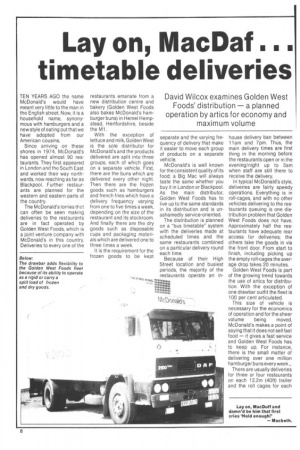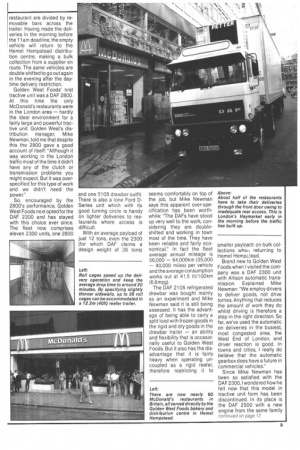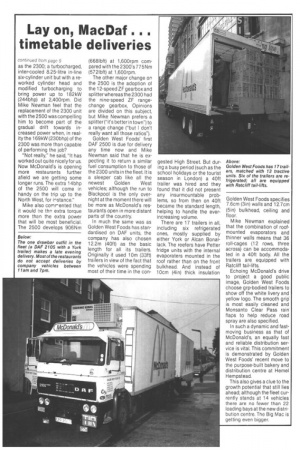Lay on, MaciDaf timetable deliveries
Page 36

Page 37

Page 40

If you've noticed an error in this article please click here to report it so we can fix it.
David Wilcox examines Golden West Foods' distribution — a planned operation by artics for economy and maximum volume
TEN YEARS AGO the name McDonald's would have meant very little to the man in the English street. Now, it is a household name, synonymous with hamburgers and a new style of eating out that we have adopted from our American cousins.
Since arriving on these shores in 1974, McDonald's has opened almost 90 restaurants. They first appeared in London and the South East and worked their way northwards, now reaching as far as Blackpool. Further restaurants are planned for the western and eastern parts of the country.
The McDonald's lorries th2t can often be seen making deliveries to the restaurants are in fact operated by Golden West Foods, which is a joint venture company with McDonald's in this country. Deliveries to every one of the restaurants emanate from a new distribution centre and bakery (Golden West Foods also bakes McDonald's hamburger buns) in Hemel Hempstead, Hertfordshire, beside the Ml.
With the exception of lettuce and milk, Golden West is the sole distributor for McDonald's and the products delivered are split into three groups, each of which goes on a separate vehicle. First, there are the buns which are delivered every other night. Then there are the frozen goods such as hamburgers and french fries which have a delivery frequency varying from one to five times a week, depending on the size of the restaurant an.d its stockroom. And finally there are the dry goods such as disposable cups and packaging materials which are delivered one to three times a week.
It is the requirement for the frozen goods to be kept separate and the varying frequency of delivery that make it easier to move each group of products on a separate vehicle.
McDonald's is well known for the consistent quality of its food; a Big Mac will always taste the same whether you buy it in London or Blackpool. As the main distributor, Golden West Foods has to live up to the same standards in its distribution and is unashamedly service-oriented.
The distribution is planned on a "bus timetable" system with the deliveries made at scheduled times and the same restaurants combined on a particular delivery round each time.
Because of their High Street location and busiest periods, the majority of the restaurants operate an in
house delivery ban between 11am and 7pm. Thus, the main delivery times are first thing in the morning before the restaurants open or in the evening/night up to 3am when staff are still there to receive the delivery.
In typical McDonald's style, deliveries are fairly speedy operations. Everything is in roll-cages, and with no other vehicles delivering to the restaurants queuing is one distribution problem that Golden West Foods does not have. Approximately half the restaurants have adequate rear access for deliveries; the others take the goods in via the front door. From start to finish, including picking up the empty roll-cages the average drop takes 20 minutes.
Golden West Foods is part of the growing trend towards the use of artics for distribution. With the exception of one drawbar outfit the fleet is 100 per cent articulated.
This size of vehicle is necessary for the economics of operation and for the sheer volume being moved. McDonald's makes a point of saying that it does not sell fast food — it gives a fast service and Golden West Foods has to keep up. For instance, there is the small matter of delivering over one million hamburger buns everyweek There are usually deliveries for three or four restaurants on each 12.2m (40ft) trailer and the roll cages for each restaurant are divided by removable bars across the trailer. Having made the deliveries in the morning before the 11 am deadline, the empty vehicle will return to the Hemel Hempstead distribution centre, making a bulk collection from a supplier en route. The same vehicles are double-shifted to go out again in the evening after the daytime delivery restriction.
Golden West Foods' first tractive unit was a DAF 2800. At this time the only McDonald's restaurants were in the London area — hardly the ideal environment for a fairly large and powerful tractive unit. Golden West's distribution manager, Mike Newman, told me that despite this the 2800 gave a good account of itself: "Although it was working in the London traffic most of the time it didn't have any of the clutch or transmission problems you might expect. But it was overspecified for this type of work and we didn't need the power."
So, encouraged by the 2800's performance, Golden West Foods next opted forthe DAF 2300 and has stayed with this choice ever since. The fleet now comprises eleven 2300 units, one 2800 and one 2105 drawbar outfit. There is also a lone Ford DSeries unit which with its good turning circle is handy on fighter deliveries to restaurants where access is difficult.
With an average payload of just 12 tons, even the 2300 (for which DAF claims a design weight of 38 tons)
seems comfortably on top of the job, but Mike Newman says this apparent over-specification has been worthwhile: ''The DAFs have stood up very well to the work, considering they are doubleshifted and working in town most of the time. They have been reliable and fairly economical." In fact the fleet average annual mileage is 56,000 — 64,000km (35,000 — 40,000 miles) per vehicle and the average consumption works out at 41.5 tit/100km (6.8 mpg).
The DAF 21 05 refrigerated drawbar was bought mainly as an experiment and Mike Newman said it is still being assessed. It has the advantage of being able to carry a split load with frozen goods in the rigid and dry goods in the drawbar trailer — an ability and flexibility that is occasionally useful to Golden West Foods. But it also has the disadvantage that it is fairly heavy when operating uncoupled as a rigid reefer, therefore restricting it to smaller payload on bulk collections when returning to Hemel HempLtead.
Brand new to Golden West Foods when I visited the company was a DAF 2300 unit with Allison automatic transmission. Explained Mike Newman: "We employ drivers to deliver goods, not drive lorries. Anything that reduces the amount of work they do whilst driving is therefore a step in the right direction. So far, we've used the automatic on deliveries in the busiest, most congested area, the West End of London, and driver reaction is good. In towns and cities, I really do believe that the automatic gearbox does have a future in commercial vehicles."
Since Mike Newman has been so satisfied with the DAF 2300, I wondered how he felt now that this model in tractive unit form has been discontinued. In its place is the DAF 2500 with a new engine from the same family as the 2300; a turbocharged, inter-cooled 8.25-litre in-line six-cylinder unit but with a reworked cylinder head and modified turbocharging to bring power up to 182kW (244bhp) at 2,400rpm. Did Mike Newman feel that the replacement of the 2300 unit with the 2500 was compelling him to become part of the gradual drift towards increased power when, in reality the 169kW (230bhp) of the 2300 was more than capable of performing the job?
"Not really," he said, "It has worked out quite nicely for us. Now McDonald's is opening more restaurants further afield we are getting some longer runs. The extra 14bhp of the 2500 will come in handy on the trip up to the North West, for instance."
Mike also corn rented that it would be thr_ extra torque more than the extra power that will be most beneficial. The 2500 develops 906Nm (668Ibft) at 1,600rpm compared with the 2300's 775Nm (572Ibft) at 1,600rpm.
The other major change on the 2500 is the adoption of the 12-speed ZF gearbox and splitter whereas the 2300 had the nine-speed ZF rangechange gearbox, Opinions are divided on this subject, but Mike Newman prefers a splitter ("it's better in town") to a range change ("but don't really want all those ratios").
Golden West Foods' first DAF 2500 is due for delivery any time now and Mike Newman said that he is expecting it to return a similar fuel consumption to those of the 2300 units in the fleet. It is a sleeper cab like all the newest Golden West vehicles; although the run to Blackpool is the only overnight at the moment there will be more as McDonald's restaurants open in more distant parts of the country.
In much the same was as Golden West Foods has standardised on DAF units, the company has also chosen 12.2m (40ft) as the basic length for all its trailers. Originally it used 10m (33ft) trailers in view of the fact that the vehicles were spending most of their time in the con gested High Street. But during a busy period (such as the school holidays or the tourist season in London) a 40ft trailer was hired and they found that it did not present any insurmountable problems, so from then on 40ft became the standard length, helping to handle the everincreasing volume.
There are 17 trailers in all, including six refrigerated ones, mostly supplied by either York or Alcan Bonallack. The reefers have Petter fridge units with the internal evaporaters mounted in the roof rather than on the front bulkhead. And instead of 10cm (4in) thick insulation Golden West Foods specifies 7.6cm (3 in) walls and 12.7cm (5in) bulkhead, ceiling and floor.
Mike Newman explained that the combination of roofmounted evaporators and thinner walls means that 36 roll-cages (12 rows, three across) can be accommodated in a 40ft body. All the trailers are equipped with Ratcliff tail-lifts.
Echoing McDonald's drive to project a good public image, Golden West Foods choose grp-bodied trailers to show off the white livery and yellow logo. The smooth grip is most easily cleaned and Monsanto Clear Pass rain' flaps to help reduce road spray are also specified.
In such a dynamic and fastmoving business as that of McDonald's, an equally fast and reliable distribution service is vital. This commitment is demonstrated by Golden West Foods' recent move to the purpose-built bakery and distribution centre at Hemel Hempstead.
This also gives a clue to the growth potential that still lies ahead; although the fleet currently stands at 14 vehicles there are no fewer than 22 loading bays at the new distribution centre. The Big Mac is getting even bigger.
































































